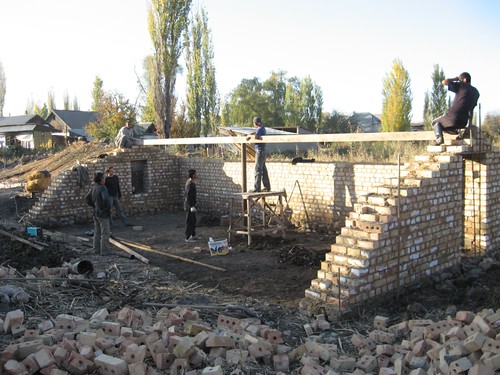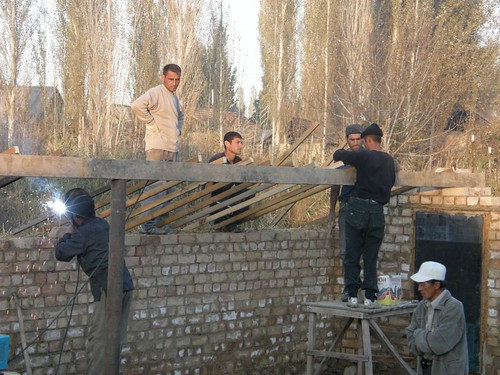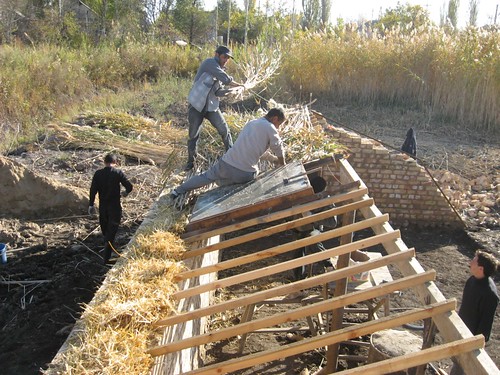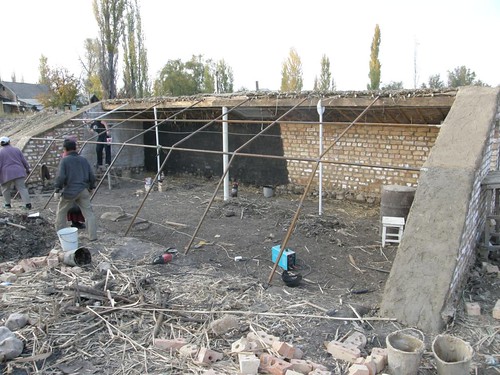In 2007, Sunlabob won an Ashden Award for their work with solar PV in Laos. In 2009, they were awarded a World Bank funded procurement project, and have made a new video about their work:
You can also watch our own video about Sunlabob:
Friday 22 January 2010
Solar PV in Laos

Thursday 21 January 2010
On the road in Devon and Cornwall
Last week Simon, the manager of our UK support programme, spent several days visiting two past Ashden Award winners in Devon and Cornwall. These are just two examples from the Southwest of communities and enterprises tackling environmental and economic challenges with innovative and inspiring solutions. By identifying key areas of need and including their views and experiences into our current research, the aim of this visit was to ensure we continue to build a strong programme of support for our UK award winners.
Kensa Engineering was Simon’s first stop. Kensa Engineering, designs, manufactures, and tests heat pump systems for installation throughout the UK. Most are small-scale ground-source heat pumps (up to 32 kW), which are supplied in kit form so that they can be installed by non-specialist plumbers and builders. Set in an old tin mine, Simon had the chance to visit and view Kensa’s manufacturing process first hand. Kensa’s offices themselves, entirely heated by ground source heating, were an example of how old buildings can be retrofitted to use a more sustainable energy system. Cornwall has a high number of “hard to treat” properties that are either off the grid or have solid walls making them difficult to insulate and heat. Ground source heating has the potential to provide an alternative solution for some of these issues through providing locally sourced energy.
Simon’s second visit was to Community Energy Plus (CEP) . This organisation is tackling the financial challenges of inefficient energy usage. CEP runs the Home Health programme which provides free energy efficiency advice and efficiency measures to communities in deprived areas of Cornwall. This has significant and long-term impacts on households for whom over 10% of their income is spent on fuel, reducing both energy use and fuel poverty.
But this trip wasn’t without its challenges. A snow storm halfway through left Simon stranded for 6 hours through the night! After finally being rescued from a drift of snow Simon continued on his visits- what a trooper!
You can find out more about all of our winners by visiting our website.
Monday 18 January 2010
Shidhulai's Rezwan interviewed on Al Jazeera
Following on from the recent post about "Easy Like Water", the film being made about Ashden Award winner Shidhulai, here's some more news. Shidhulai's founder, Mohammed Rezwan, has been interviewed by Riz Khan on Al Jazeera English. You can watch the interview in two parts here:
Part 1
Part 2
Tuesday 12 January 2010
Easy Like Water - Bangladesh
In 2007, Shidhulai Swanirvar Sangstha won an Ashden Award for their work with boats using solar power to provide education, healthcare, lighting and other services to people in Bangladesh.
Now, the Sundance Institute is producing a film about them, called Easy Like Water. Here's a trailer they have released:
You can also watch the Ashden Awards film from 2007:
Tuesday 5 January 2010
Gaia Association at Copenhagen
Gaia Association won an Ashden Award in 2008 for their work with cookstoves burning bioethanol made from waste products. The stoves are often used in refugee camps.
Milkyas Debebe, their Managing Director, was at Copenhagen, where he was able to meet with the Ethiopian Prime Minister Meles: Harry Stoves, who has worked with Gaia Association for some time, said:
Harry Stoves, who has worked with Gaia Association for some time, said:As you know, Prime Minister Meles has been in the forefront of negotiations at COP15 and we have been very grateful for his efforts. He is championing, on behalf of Africa and the Global South, exactly the right things to make improved stoves and clean liquid fuels available in Africa.
Below is a recent film made about the work of Gaia Association:
He is asking for more technical and financial assistance for Africa to enable Africa to quickly reduce its Global Warming Commitment. Very possibly residential fires for cooking and agricultural fires for land clearing and preparation are the two largest producers of GHG, with deforestation being the other major contributor. The production of black carbon aerosols that reach the atmosphere and travel great distances may quite possibly be even more harmful that the production of GHG. Residential cooking fires and charcoal production and use may in fact contribute to 18% to 25% of black carbon in the atmosphere and this black carbon may have a higher GWC than other sources of black carbon production because of when and where this black carbon is produced. The alcohol stoves essentially reduce this black carbon to zero. Thus a million ethanol stoves in Africa could make a significant reduction in black carbon pollution from Africa, and this could have a swift and immediate impact on Africa's contribution to the problem.
Prime Minister Meles has charted out a carbon neutral strategy for Ethiopia, already a country that has one of the lowest carbon footprints in Africa (at least before black carbon is considered. He laid out Ethiopia's strategy in this way:
Ethiopia shall:
1. Produce all of its power from clean or renewable sources, principally hydro, wind, geothermal and solar.
2. Use liquid biofuels to reduce its dependence on petroleum fuels. It shall fuel blend, and is already doing so, and it will use biofuels for cooking.
3. Afforest or re-forest Ethiopia and reclaim the land with appropriately chosen grasses, bushy plants and trees. The Prime Minister highlighted the MERET program as one successful example.
After the Side Event in which the above photo was taken concluded, and which the Prime Minister chaired (having just come from a negotiating session), Milkyas Debebe was able to speak to him directly about the ethanol stove project. The Prime Minister clearly stated his full support for the project and indicated that it was intrinsic to the nation's strategy.
To paraphrase, he said to all at the side event: 'With or without an agreement at COP15, and with or without proper support from the more developed nations, we will do what is necessary in Ethiopia to reduce or eliminate our impact on global warming.'
This was very inspiring indeed.
And the 2008 Ashden Award film on their work:

AfricaConnect
AfricaConnect is a newly established charity with the specific aim to make:
2010: The Year of Electrifying Africa
AfricaConnect seeks to raise awareness of the immediate need to dramatically increase the availability of energy and electricity throughout Africa. AfricaConnect aims to facilitate progress through discussion and projects, to implement the electrification of Africa.
AfricaConnect’s campaign is structured with a 4 step plan:
- Establish a publicity and awareness raising campaign - to demonstrate the connection between improved access to electricity and poverty alleviation. Advertisements will show just how important, access to energy is for Africa's development.
- Produce the Africa Energy Summit - to unite leaders in the international energy community, politicians and community representatives to make a sustained commitment to drive forward programmes of electrification in Africa.
- Organise the Electric Africa concert to celebrate Africa's music and art.
- Develop the Electric Africa Database - a database of power projects, to document all existing, planned and required electrification projects.
Geres constructing solar greenhouses in Kyrgystan
Geres won an Ashden Award in 2009 for their work building solar greenhouses in Ladakh, India. They have now started construction of similar structures in Kyrgystan:




 Here's a picture of a finished greenhouse in Ladakh:
Here's a picture of a finished greenhouse in Ladakh: Watch the video we made about the work of Geres in Ladakh:
Watch the video we made about the work of Geres in Ladakh:
Aprovecho features on BBC World Service
Aprovecho, who won an Ashden Award in 2009, in conjunction with Shengzhou Stove Manufacturer, have featured on the BBC World Service special report on climate change. They are in the Asia/China section. Check it out here
Click here to read the rest of this post.Ashden Award winners in the news
A couple of recent stories from the Times of India:
Sunshine on his shouldersRead the full story here
A decade ago, rose pickers in a village near Bangalore would go clumsily about their job in the early morning hours, a basket in one hand and a lamp in the other. It was hell on bent backs. Today, they work for longer hours and with both hands free, in fields lit by solar power. The man who harnessed the sun for them is Harish Hande, 41, managing director, Selco, a company specialising in reaching cheap solar energy to those who need it. Selling over 80,000 installations of photovoltaic (PV) solar-home-systems that provide lighting and are suitable for radios and fans since 1995, Hande has proved that one can wed business with social responsibility. Linking solar lighting to income generation, Selco employees went doorto-door listening to the needs of potential customers and explaining how a few hours of extra light after sunset could lead to more earnings, fewer fumes from gas lamps, and more study time for kids.
A ray of lightRead the full story here Click here to read the rest of this post.
The timing couldn't have been better. As Union environment minister Jairam Ramesh was reiterating India's commitment to a low-carbon economy at Copenhagen on December 7 last year, his colleague, new and renewable energy minister Farookh Abdullah, was inaugurating a 2 MW, zero-carbon footprint solar power plant in Jamuria, Asansol. Incidentally, it once used to be an abandoned thermal power plant with a high carbon foot print.
"It sent a strong message that India is empowered in green energy," says S P Gon Chaudhuri, an engineer and the man behind this green transformation. Chaudhuri has been tapping solar energy for lighting up villages across east India since the time when global warming looked like a distant threat and carbon footprints figured only in science journals

